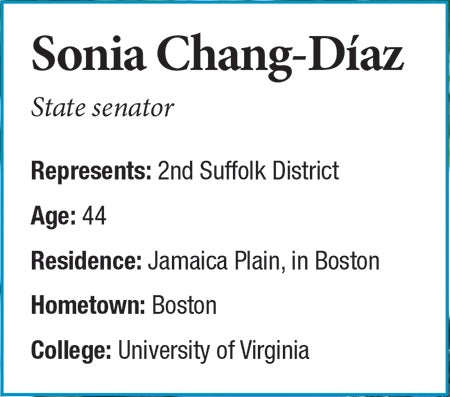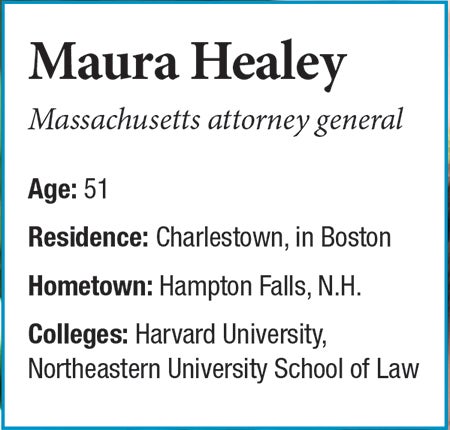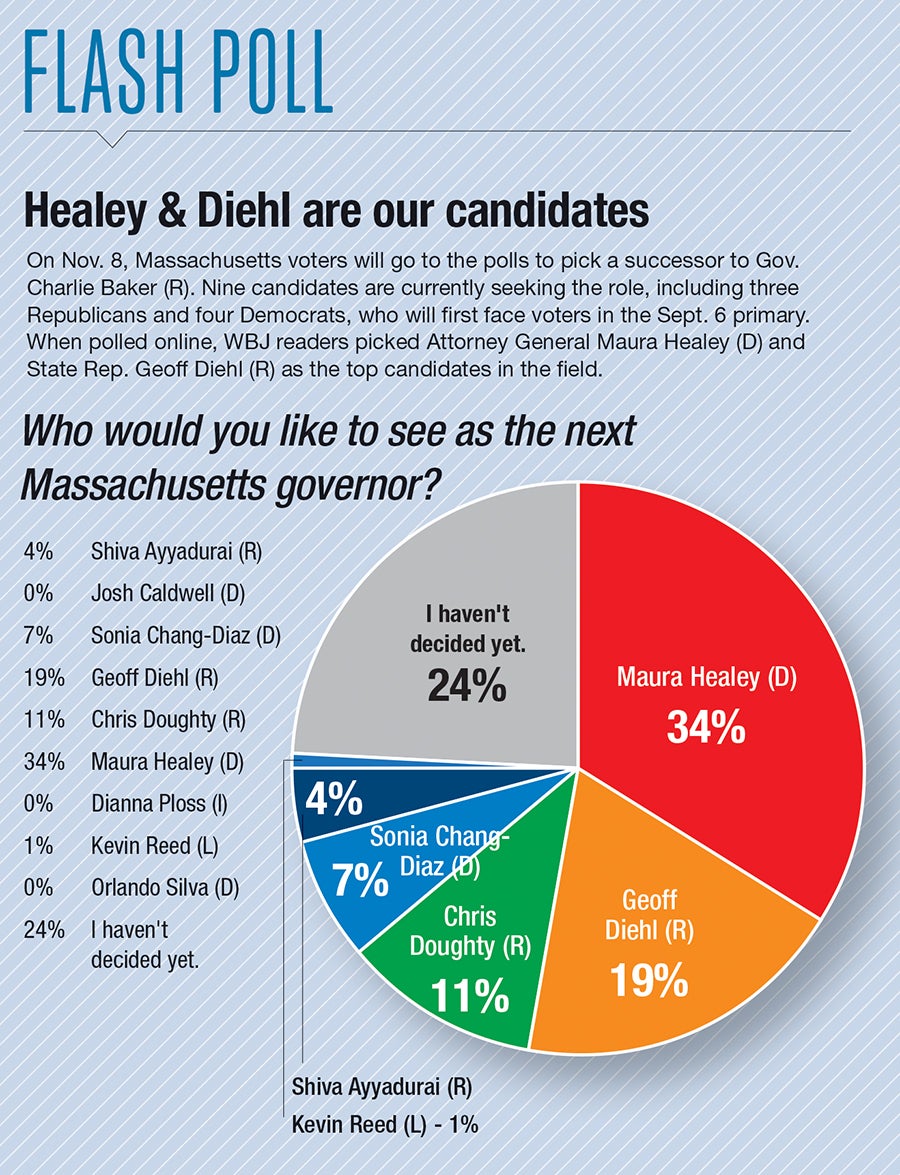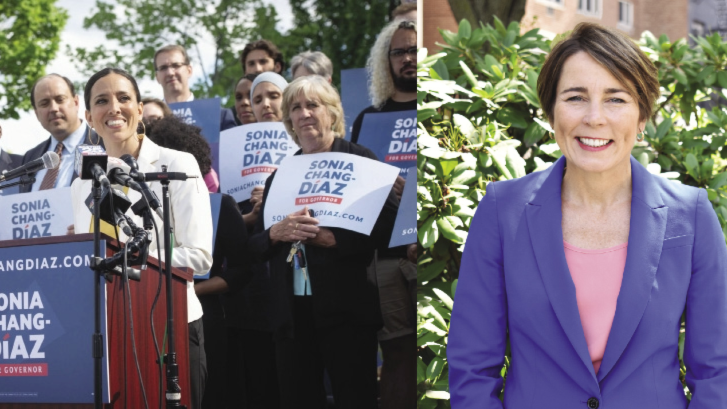Worcester Business Journal spoke to Democratic candidates for governor Sonia Chang-Díaz and Maura Healey ahead of the party’s convention in Worcester, to ask about their stances on the state’s economic issues, particularly how they pertain to Central Massachusetts.
Get Instant Access to This Article
Subscribe to Worcester Business Journal and get immediate access to all of our subscriber-only content and much more.
- Critical Central Massachusetts business news updated daily.
- Immediate access to all subscriber-only content on our website.
- Bi-weekly print or digital editions of our award-winning publication.
- Special bonus issues like the WBJ Book of Lists.
- Exclusive ticket prize draws for our in-person events.
Click here to purchase a paywall bypass link for this article.
On June 3, delegates from the Massachusetts Democratic Party will convene at Worcester’s DCU Center, as well as virtually, to determine which candidate they will throw their support behind ahead of the state primary in September. A candidate must receive support from at least 15% of delegates to be on the primary ballot.
Two candidates have emerged as being able to meet that demand: Sonia Chang-Díaz, a state senator hailing from Boston’s Jamaica Plain neighborhood, and Maura Healey, who serves as attorney general for Massachusetts. Healey is more experienced in running a statewide election and currently polls well ahead of Chang-Díaz, but the state senator has run an aggressive campaign based on a more progressive policy platform.
Worcester Business Journal spoke to both candidates separately, ahead of the convention, to ask about their stances on the state’s economic issues, particularly how they pertain to Central Massachusetts.
As governor, how would you support the ongoing economic development in Central Massachusetts?
Sonia Chang-Díaz: My strategies as governor are always going to be grounded in the fundamentals, and our best bet for economic growth, economic prosperity, and broadly shared prosperity for Central Massachusetts, is investing in our people and our infrastructure.

This tracks very closely with the things I’ve heard over and over again from both business leaders and employees. Their current position is, and I think this will continue to be true after the pandemic, is there are difficulties in finding the workforce they need and frustrations with transportation infrastructure. This is why the fight for the Student Opportunity Act was a five-year passion for me, and I was so proud to do that in deep partnership with some phenomenal champions from Worcester, like State Rep. Mary Keefe and Tracy Novick, field director for the Massachusetts Association of School Committees. This is going to create, and already is creating, millions and millions of dollars’ worth of new investments in the young people of Worcester and Central Mass., with more investment to come in the next five years.
Maura Healey: As governor, that is going to be my top priority. How do you build and grow economies across this state? And certainly, in Worcester and Worcester County, there is an economic boom. It's happening in Central Mass right now.
And what our next governor needs to do is to make sure we're really pushing on all fronts, that we're practicing the full potential of Central Mass. and Worcester.
In Central Mass., I think about the opportunities we have there. You've seen life sciences move there, and you've got opportunities with climate tech, clean energy manufacturing, and climate security-related manufacturing.
There's a lot that we can be bringing to Worcester and Central Massachusetts But those are some of the things that are top-of-mind to me in order to make sure that Massachusetts remains competitive with other states to make sure that people stay in Massachusetts.
Worcester's population is 46% people of color. Do you have plans for promoting diversity in business and the economy?
Healey: I was a business lawyer and a business litigator at Boston law firm WilmerHale for eight or nine years, and then left to become head of the civil rights division at the attorney general's office, and I served in that capacity for many, many years before becoming an attorney general. So issues of equity have always been important to me.

You've got to have an approach that basically makes sure you're applying an equity lens to all your agencies. When you're talking about jobs or housing or access to health care, education, transportation, or mental issues, racial injustice disparities exist across all those realms.
I think about the African community in Worcester I've come to know or the Vietnamese community, there are a number of folks in Worcester and Worcester County for whom English is not a first language. We need to do more to reach out to make sure that they are aware of the programs out there to help them.
Chang-Díaz: There are huge disparities in access to early education and care based on both geography and what your income is. That's why we see our youngest learners coming into kindergarten already with huge disparities in terms of word exposure and experience with structured learning environments. So closing disparities begins in those earliest years, and then you look at my proposal for debt-free public college. This would be a huge boon for communities of color and immigrant communities.
Let me also say there are some very specific tactical things like passing the Work and Family Mobility Act, that will allow all qualified drivers in Massachusetts, folks who have passed the road test or otherwise are qualified, but who lack federal immigration status to finally be able to access a driver's license in Massachusetts. Any person can grasp with common sense how much a driver's license is critical to accessing economic and educational opportunities.
The housing situation in Massachusetts is getting out of control, and rents and real estate in Central Mass. are aggressively rising. How would you, as governor, address the situation?
Chang-Díaz: Investing in our mass transit systems will help alleviate housing pressures, because it will facilitate the building of more housing in a broader array of communities across the state. When there's more robust transportation options, developers and families will be more willing to build and live in more places, which will alleviate some of the pressure on some markets that are really overheated right now, but we can't do it just with transportation alone.
It means putting more funding into the development of affordable housing. That's why I'm a huge supporter of the HERO Act, which would increase the transfer fee when real estate is transferred, because that's a huge amount of money in this overheated real estate market right now.
We can harness some of that to fund more affordable housing development across our state. And then we need to leverage creative tools like land trusts, which is something that I've seen have a lot of success in my district in Boston.
Healey: It is critically important we have affordable housing for a range of incomes in this state. It is critical for the safety and well-being of our families. It's also necessary for our economy because I talked to too many CEOs across the state and housing costs are the reason why their employees are leaving and looking to move to Texas or North Carolina or Florida. And so we need to address this as an economic imperative.
I talked about expanding our housing supply. That means doing it through addressing local zoning barriers and to increase our state resources and incentives. We have to target first-time home ownership, and this will also help us close off the racial wealth gap. We need to really work on overall increasing economic mobility of our lower-income residents in public and assisted housing through workforce development opportunities, and I've supported what Gov. Charlie Baker has done in terms of creating units around transit stations.
This interview was conducted and edited for length and clarity by WBJ Staff Writer Alexander MacDougall.


